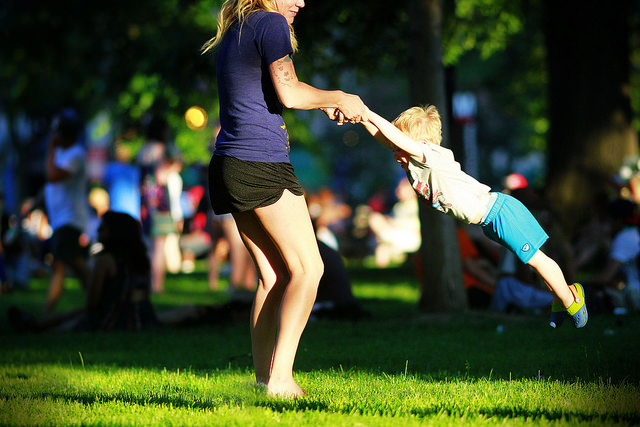“If my son did that, we would take away his phone and probably his car for a couple weeks,“ my friend explained.
“What would he learn from having his things taken away?” I asked.
He looked puzzled for a moment. “I’m not sure. Hopefully, not to do it again.”
“Maybe. Or maybe, he would learn a better way to hide it from you. That’s what I learned from punishments like that when I was a teenager.”
I realize that my parenting methods are somewhat unconventional. I’m used to people looking at me sideways when I tell them that I don’t teach my children through punishment. I don’t want them to do what’s right just to avoid some punitive action from me.
I don’t have any desire to micromanage my children’s daily activities. I know parents who check their kids’ grades online every day. They look up the homework assignments for their classes and verify that it’s done every day. They snoop through their kids’ rooms, take their phones for random checks, and even check the mileage on their cars. These are well intended moms and dads who want their kids to be successful. But, I think sometimes those parental controls actually do more harm than good.
I believe that life is our teacher. We learn far more from our experiences than we do from mom and dad policing us.
My job as a conscious parent is not to enforce rules, or demand perfect grades, or require that their bedrooms be spotless, or over-schedule their days with activities that don’t mean anything to them. My job is to educate my kids, to teach them how to think for themselves, to give them all the information I can, and then stand back and let them learn through their own experiences.
This is not to say that I don’t have expectations for my children. I have two incredibly intelligent, creative, capable kids. I expect them to use their talents and gifts. I expect them to see their potential, and believe in their own ability to make things happen for themselves. I expect them to do their best in everything they do.
If my kids are not doing their best, I try to help them figure out why.
I know that if their grades aren’t spectacular, it is not an issue of a lack of intelligence—it’s most likely an issue of motivation. Instead of punishing them, I ask questions to help them figure out how to get better results: Are you missing assignments? Are you bored in class? Do you get along with the teacher? What distracts you in that class?
I don’t take responsibility for fixing the issue, I help them identify it so they can fix it.
I have two kind, compassionate kids. I expect them to see everyone as equal. I expect them to treat others with respect, to help others when they can, and to honor others as part of a collective body that they are also part of. The only way I know to teach kids how to be compassionate is to model it for them with my own words and actions, and to praise them when I see them being awesome humans.
Children learn what they live. It’s my responsibility to treat them with kindness and respect, so they know what that feels like.
I have two open-minded, free thinking, analytical kids. I love talking to my kids—they amaze me constantly. The way they see the world fascinates me, and I’m always proud to hear them expressing opinions that I know are authentically theirs’.
I never wanted to teach my children what to believe. I only wanted to teach them how to think for themselves, how to weigh information against their own intuition and decide if it feels right for them. I ask so many questions, sometimes just to hear the answer, sometimes to provoke thought. They know that it is safe for them to answer honestly, because I never belittle them or tell them they are wrong.
The only way I know to foster free-thinking in my children is to create an environment for them where self-expression feels safe. I treat their opinions with respect, even when I don’t agree with them. We can debate about politics, religion, and all the world’s problems with no drama.
Usually, I feel like I learn more from those discussions than they do.
I want my kids to be curious about the world. I want them to respect the earth. I want them to value people more than money. I want them to get to know themselves intimately so they can find their passion and purpose in this life. I want them to make good choices for themselves from a place of self-love. I want them to be healthy and happy. I want their words and actions to align with who they are at their perfect little centers. I gently encourage them in these things, while also reminding them that they are responsible for their choices and the consequences that come with them.
My only real parental goal every day is to make sure my children know that I love them unconditionally. I don’t need to take away their privileges or possessions to force their obedience or compliance with arbitrary rules. Instead, I make sure they know that I believe in them and trust them to do the right thing. I give them a safe place to talk about whatever is on their minds. On the rare occasions that they disappoint me, I tell them that I know they can do better. That’s really all they need from me.
At the end of the day, I know I’m not raising kids—I’m raising adults. By allowing them to have space to self-govern, encouraging critical thinking, and giving them some basic moral standards—I’ve given them all they need to be successful, productive, amazing citizens of the planet.
They are well-equipped to become who they are meant to without my interference.
Author: Renée Dubeau
Photo: Pabak Sarkar at Flickr
Editor: Renée Picard







Read 12 comments and reply